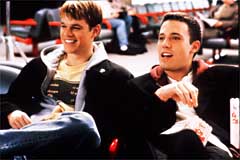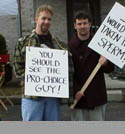| 'DOGMA': 2 FALLEN ANGELS WANT BACK IN (October 5, 1999)
BY JANET MASLIN (New York Times)

Matt Damon, left, and Ben Affleck as banished angels in ``Dogma.''
(Photo Courtesy Darren Michaels/Miramax Films)
|
NEW YORK -- Nothing could be more irrelevant to Kevin Smith's audacious "Dogma" than ticking off a list of its cheerful outrages against hidebound Catholicism. Yes, Smith enjoys shock value, but this time he makes it mercilessly funny and places it in the context of an obviously devout, enlightened parable.
Given this filmmaker's special vernacular, a wild hybrid of comic books, off-the-wall rhetoric and unexpected intellectual heft, his ability to bushwhack audiences with serious thought has never seemed more worthwhile. With "Dogma," Smith makes a big, gutsy leap into questions of faith and religion. He miraculously emerges with his humor intact and his wings unsinged.
No doubt about it: "Dogma" is a hot potato. Corporate thinking, which Smith satirizes with images of a highly profitable golden calf in Mickey Mouse pants, has already forced the film's distribution from Miramax (a Disney subsidiary) to the more independent Lion's Gate.
But no whiff of controversy can diminish the exhilarating, freewheeling way in which Smith kicks up a religious debate of equal interest to theologians and surfers. Sharply satirical yet gratifyingly cynicism-free, "Dogma" honestly embraces the outlook summed up by one of its characters, "I have issues with anyone who treats faith as a burden instead of a blessing."
With that in mind, Smith concocts a cosmological challenge. He imagines two cool-dude angels, Loki and Bartleby (Matt Damon and Ben Affleck), who have been banished from heaven to Wisconsin for so long that they've come up with a dangerous plan. It seems that Cardinal Glick, played by George Carlin (whose irreverence is cited by Smith as an inspiration), is rededicating a church in Red Bank, N.J. This is part of his plan to reawaken organized Catholicism with a peppy public relations campaign in which new images of "the buddy Christ" will wink and give a thumbs-up sign. (When asked to compare Catholicism to the tobacco industry, the cardinal exclaims, "If only we had their numbers!")
The premise of "Dogma," which suggests that Smith might have been as shrewd a lawyer as he is a filmmaker, is that the church re-dedication will allow the banished angels to re-enter heaven, thus proving God fallible and, by extension, negating all existence. Understanding the fine points of this plan is not essential to finding the movie extremely funny.
Smith, who came up with this idea back in his "Clerks" days at the Quik-Stop but has since given it the brighter gloss of "Chasing Amy," then piles on an array of characters struggling over the fate of all existence. And lets the chips fall where they may.
The film's real center is a heroine named Bethany, apparently first written as an ingenue and made a lot more interesting by the world-weary presence of Linda Fiorentino. "I think God is dead," says Bethany, who works at an abortion clinic and tithes part of her salary from Planned Parenthood to the church. "The sign of a good Catholic," sighs Janeane Garofalo, as one of her co-workers.
The film soon surrounds Bethany with such creations as Metatron (Alan Rickman), an angel who delivers God's messages with a suitably English accent, and the inevitable Jay and Silent Bob (Jason Mewes, who ought to bottle his character, and Smith himself). Jay explains, with characteristic four-letter candor, that he and Bob thought an abortion clinic would be a good place to meet loose women.
From Chris Rock as a 13th Apostle who literally falls out of the sky, to Salma Hayek as a stripper-muse who claims credit for all of the top 20 highest-grossing movies except "Home Alone," to Jason Lee as a fallen angel who cites central air-conditioning as the most exquisite sin, "Dogma" abounds with nuttily triumphant imagination.
It also has its undue excesses, like an excrement monster whose antics add nothing to the ambience. And although Smith's strong suit remains clever conversation, he lets this story build toward more action than it can handle, particularly when angel wings get caught in a shootout. Nonetheless, whenever the film goes out onto a limb, as in that explosive finale, it has an impressive way of redeeming itself with strong convictions and good humor.
The actors here, particularly Ms. Fiorentino, Affleck and Damon, bring great, understandable enthusiasm to Smith's smart talk and wild imaginings. And well they should. "Verbal trampoline" is a phrase Affleck has used to describe Smith's material, and "Dogma" illustrates that thought excitingly. When even a movie's opening disclaimer brings down the house, expect some very high leaps indeed.
"Dogma," which is as frank-talking as Smith's other films, and which culminates in some violence, will be shown Monday night and Tuesday as part of the 37th New York Film Festival before opening commercially next month.
PRODUCTION NOTES:
'DOGMA'
Written and directed by Kevin Smith; director of photography, Robert Yeoman; edited by Smith and Scott Mosier; music by Howard Shore; production designer, Robert Holtzman; produced by Mosier; released by Lions Gate Films. Running time: 125 minutes. This film is not rated.
With: Ben Affleck (Bartleby), George Carlin (Cardinal Glick), Matt Damon (Loki), Linda Fiorentino (Bethany), Janeane Garofalo (Liz), Salma Hayek (Serendipity), Jason Lee (Azrael), Jason Mewes (Jay), Alan Rickman (Metatron), Chris Rock (Rufus) and Kevin Smith (Silent Bob).
Back to Dogma Press...
|

































